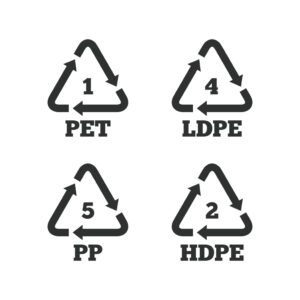Recycling rulebook
Recycling rulebook
Recycling; we all want to do our bit but sometimes it can be a bit confusing understanding what you can (and can’t) recycle.
As a business we are committed to making our Co-op products as easy to recycle as possible;
- Our Co-op pizza boxes are now fully recyclable, as the pizza’s now come on recyclable cardboard trays – saving 200 tonnes of non-recyclable polystyrene.
- Our water bottles are made from 50% recycled materials, preventing 270 tonnes of refuse
- In selected stores we offer compostable carrier bags which can be used in food caddies and bins, saving 311 tonnes of plastic waste
But day to day, recycling can still be a tricky path to navigate! Here are a few simple tips to help you recycle with confidence!
Get to know what these symbols on packaging mean.

They will help you identify which items can and can’t be recycled. And remember, clean out all items for recycling as any soiled items can render the entire contents of your recycling bin useless!Items with the #1 symbol are commonly accepted by most councils for recycling collection. These containers typically are:
- Soft drinks bottles
- Liquid cleaner bottles
- Shampoo bottles
- Food packaging e.g.. Punnets
#2 are also commonly collected by councils for recycling. Items include:
- Milk cartons
- Cleaning products
- Yoghurt pots
- Soap dispensers
#5 items can also easily be recycled – this typically includes margarine tubs and microwave meal trays
#4 items are generally plastic films and the can be recycled but often they need to be taken to a carrier bag recycling point often found at supermarkets. A rule of thumb is that these items are usually stretchable, such as:
- Carrier bags
- Bread bags
- Breakfast cereal liners
- Frozen food bags
- Bags for loose fruit and vegetables
- Bubble wrap
The majority of paper and cardboard is recyclable including junk mail, fruit and veg punnets, magazines and newspapers and window envelopes. Don’t forget to recycle your metals too – this includes tins, soft drinks cans and aerosol cans
Stop & think! Recycling don’ts include:
- Sticky Post-it notes and labels – the glue on the adhesive strip can’t always be removed during the recycling process.
- Toothpaste and other squeezable tubes – often the tubes combine different materials.
- Drinking glasses and Pyrex dishes – they do not process in the same way as regular glass bottles and sometimes contain lead which needs to be avoided within the recycling process.
- Paper receipts printed on shiny, thermal paper – these are also coated in chemicals that need to be kept out of the recycling process
- Crisp packets – crisp residue and grease clings to the packet which makes them unrecyclable
- Salad / produce bags – Pre-prepared bags of salad combine different types of plastic, making them difficult to separate and process.
- Cotton wool – some cotton wools are blended with synthetic materials, such as polyester, so are unsuitable for recycling.
Don’t assume you can recycle something; if in doubt, leave it out and put it in your general waste bin.
To find out more about recycling in your area visit https://www.recyclenow.com/local-recycling
Find out more here [https://www.coop.co.uk/environment/packaging-recycling] ways in which we’re making our packaging easier on the environment and how it’s made a difference!
